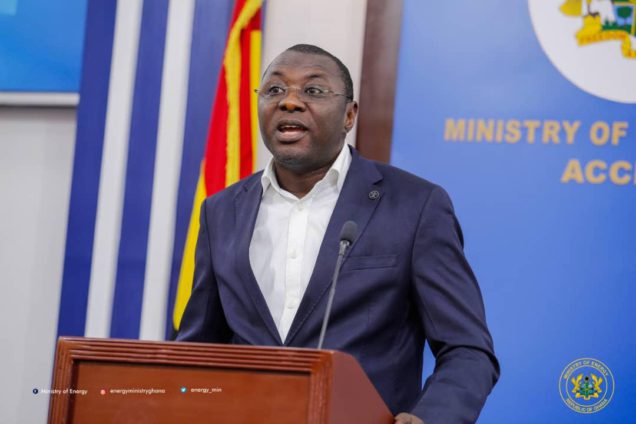Joshua Worlasi AMLANU & Ebenezer Chike Adjei NJOKU
[email protected]/ ebenezer.njoku@thebftonline,com
Finance minister Dr. Mohammed Amin Adam says the nation is making strides in restoring macroeconomic stability, but risks and fiscal pressures still loom.
In government’s monthly economic update on Friday, Dr. Adam reported promising signs of recovery driven by an International Monetary Fund (IMF) support programme. However, he stressed that the nation is “not out of the woods yet”.
“We are making remarkable progress toward the restoration of macroeconomic stability and economic recovery,” Dr. Adam stated.
“In spite of emerging fiscal pressures including security spending to maintain peace and order, we are determined to hold the line to ensure that we meet our fiscal targets for the year,” he added.
Government continues to implement an ambitious fiscal consolidation programme under the IMF’s Poverty Reduction and Growth Facility (PC-PEG). Early results are encouraging, with the primary balance improving and public debt starting to decline as a percentage of GDP.
“The fiscal consolidation programme is holding, as primary balance on commitment basis improved by about 4 percentage points to a deficit of 0.3 percent of gross domestic product (GDP) at the end of 2023,” the minister reported.
He added that the public debt trajectory is already showing signs of improvement,since the debt to GDP ratio reduced to 71.4 percent of GDP at the end of 2023 from 73.5 percent of GDP at the end of 2022.”
However, revenue collection has lagged behind targets so far in 2024. Adam warned that expenditures may need to be cut if this trend continues.
“We will not hesitate to adjust expenditures accordingly in the event that our revenues fall short of the target,” he cautioned, adding that the upcoming mid-year review of fiscal policy programmed for July will be used to make necessary adjustments to the budget to stay on course, should the need arise.
“As part of implementing the PC-PEG, Cabinet has approved the plan for restructuring and recapitalisation of the National Investment Bank. This will involve a programmed equity injection of about GH¢2.3billion over the next 12 months,” the fiscal policy chief confirmed.
The minister reaffirmed government’s commitment to deep reforms in taxation, public financial management and other areas to address structural weaknesses.
He cited IMF reviews that found the programme was achieving its goals of “restoring macroeconomic stability and debt sustainability, building resilience…and laying the foundations for stronger and more inclusive growth”.
Economic growth rebounded to 2.9 percent in 2023, exceeding projections. However, Adam stressed that more progress is needed, targetting 5 percent growth, single-digit inflation, improved reserves, higher tax revenues and full debt sustainability by 2028.
While touting the programme’s success so far, the minister acknowledged that “significant risks exist”, including potential security costs and election expenses which could intensify budget pressures.
“We have shared the progress we are collectively making to restore macro-economic stability, and we remain thankful for the forbearance and partnership of Ghanaians,” Dr. Adam said.
“However, we know that significant risks exist. Raising extra revenue to coincide with emerging critical security and election-related expenditures is likely to intensify prevailing budget pressures.”
No easy route
Financial Analyst Kwadwo Achaempong argued that the trajectory of inflation, generally, is encouraging and expressed hope the second and third quarters will record a return to significant drops in the inflation rate. With it, interest rates will go down – especially if the cedi holds its own against the dollar.
“I think John Kwakye (IEA) did a brilliant piece a day or two ago in the B&FT,” he said regarding recommendations by the Director of Research at the Institute of Economic Affairs on multi-phased measures to save the cedi. These was published last week by this paper.
Regarding measures including encouraging foreign companies to stagger repatriation of profits/dividends, Mr. Acheampong believes there must be quality incentives for these companies to agree.
“We need something to make it worth their while, because they may not be that benevolent. Also, this may drive away foreign investors who are thinking of investing here [if not implemented properly],” he said.
Others such as employing forwards to regulate/curb speculation and maintaining fiscal discipline with IMF oversight should be easier to achieve, added.
“In the medium-term, [I agree that] we must build up FX reserves to at least 70 percent of currency in circulation; and BoG is gradually doing that with the domestic gold purchase programme,” he noted, while also calling for an expansion of export earnings through industrialisation and ultimately increased exports.
As the nation nears a critical presidential election in 2024, maintaining fiscal discipline and economic reforms will be a major test for government. But officials insist the nation is on the right path after years of instability.










